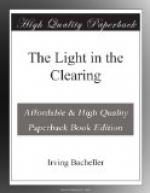Aunt Deel did not speak. She just put her arms around me and laid her dear old head upon my breast. Uncle Peabody turned away. Then what a silence! Off in the edge of the woodland I heard the fairy flute of a wood-thrush.
“Purvis, you drive that load on the floor an’ put up the hosses,” Uncle Peabody shouted in a moment. “If you don’t like it you can hire ’nother man. I won’t do no more till after dinner. This slave business is played out.”
“All right,” Purvis answered.
“You bet it’s all right. I’m fer abolition an’ I’ve stood your domineerin’, nigger-driver ways long enough fer one mornin’. If you don’t like it you can look for another man.”
Aunt Deel and I began to laugh at this good-natured, make-believe scolding of Uncle Peabody and the emotional strain was over. They led me into the house where a delightful surprise awaited me, for the rooms had been decorated with balsam boughs and sweet ferns. A glowing mass of violets, framed in moss, occupied the center of the table. The house was filled with the odors of the forest, which, as they knew, were dear to me. I had written that they might expect me some time before noon, but I had begged them not to meet me in Canton, as I wished to walk home after my long ride. So they were ready for me.
I remember how they felt the cloth on my back and how proudly they surveyed it.
“Couldn’t buy them goods ’round these parts,” said Uncle Peabody. “Nor nothin’ like ’em—no, sir.”
“Feels a leetle bit like the butternut trousers,” said Aunt Deel as she felt my coat.
“Ayes, but them butternut trousers ain’t what they used to be when they was young an’ limber,” Uncle Peabody remarked. “Seems so they was gettin’ kind o’ wrinkled an’ baldheaded-like, ’specially where I set down.”
“Ayes! Wal I guess a man can’t grow old without his pants growin’ old, too—ayes!” said Aunt Deel.
“If yer legs are in ’em ev’ry Sunday they ketch it of ye,” my uncle answered. “Long sermons are hard on pants, seems to me.”
“An’ the longer the legs the harder the sermons—in them little seats over ’t the schoolhouse—ayes!” Aunt Deel added by way of justifying his complaint. “There wouldn’t be so much wear in a ten-mile walk—no!”
The chicken pie was baking and the strawberries were ready for the shortcake.
“I’ve been wallerin’ since the dew was off gittin’ them berries an’ vi’lets—ayes!” said Aunt Deel, now busy with her work at the stove.
“Aunt, you look as young as ever,” I remarked.
She slapped my arm and said with mock severity:
“Stop that! W’y! You know better—ayes!”
How vigorously she stirred the fire then.
“I can’t return the compliment—my soul! how you’ve changed!—ayes!” she remarked. “I hope you ain’t fit no more, Bart. I can’t bear to think o’ you flyin’ at folks an’ poundin’ of ’em. Don’t seem right—no, it don’t!”




